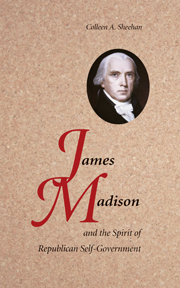Book contents
- Frontmatter
- Contents
- Acknowledgments
- List of Abbreviations for Sources
- Preface
- Introduction: Madison's Legacy
- 1 Republican Opposition
- 2 The Federalist Agenda
- 3 Madison and the French Enlightenment
- 4 The Commerce of Ideas
- 5 The Politics of Public Opinion
- 6 Madison and Jefferson: An Appeal to the People
- 7 The Spirit of Republican Government
- Epilogue: The Philosopher's Stone and the Poet's Reprise
- Bibliography
- Index
- References
5 - The Politics of Public Opinion
Published online by Cambridge University Press: 05 June 2012
- Frontmatter
- Contents
- Acknowledgments
- List of Abbreviations for Sources
- Preface
- Introduction: Madison's Legacy
- 1 Republican Opposition
- 2 The Federalist Agenda
- 3 Madison and the French Enlightenment
- 4 The Commerce of Ideas
- 5 The Politics of Public Opinion
- 6 Madison and Jefferson: An Appeal to the People
- 7 The Spirit of Republican Government
- Epilogue: The Philosopher's Stone and the Poet's Reprise
- Bibliography
- Index
- References
Summary
Throughout the 1790s, Madison worked to prevent measures that he believed were contrary to the sovereign authority of the people as expressed in the Constitution. He also sought to establish and secure a political system dependent on the ongoing sovereignty of public opinion. These modes of authority informed Madison's stances on policy questions during the 1790s. To show as clearly as possible how Madison's republican theory informed his political practice in this period, the issues of the Washington administration will be treated thematically rather than chronologically in this chapter. We begin with those measures that raised the issue of the relationship between public opinion and constitutional meaning, that is, the adoption of a bill of rights, the establishment of a national bank, and governmental support of manufactures, and then proceed to the policy issues that impacted the ongoing politics of public opinion, viz., the national debt, foreign policy, and commercial discrimination. In the next chapter the Alien and Sedition Acts and the Kentucky and Virginia Resolutions will be examined, as well as the main philosophic points of agreement and disagreement between the two leading Republicans, Madison and Jefferson.
When Madison introduced the Bill of Rights in the first Congress in 1789, he did so with some reluctance. His concern was that the specification of certain rights in the Constitution might be erroneously construed to disparage other rights not listed in the document.
- Type
- Chapter
- Information
- James Madison and the Spirit of Republican Self-Government , pp. 107 - 123Publisher: Cambridge University PressPrint publication year: 2009



